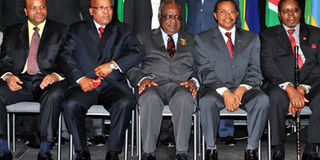SA leaders press for reforms in Zimbabwe at summit

PHOTO/ AFP
South African President Jacob Zuma (2nd L), King Mswati lll of the Kingdom of Swaziland (L), Namibia's President Hifikepunye Pohamba (C), Tanzania President Jakaya Kikwete (2nd R) and Malawi President Bingu wa Mutharika sit together for a group photo at the opening of the tripartite SADC summit in Johannesburg, on June 12, 2011.
JOHANNESBURG, Sunday
Southern African leaders prepared on Sunday to again pressure Zimbabwe President Robert Mugabe to make democratic reforms ahead of new elections, after a day of talks failed to settle the issue.
Leaders of the 15-nation Southern African Development Community met late on Saturday on the eve of a broader free trade summit.
After failing to reach a decision, they planned to resume talks late on Sunday.
The region’s security “Troika” body in March issued a unusually sharp rebuke to Mugabe, demanding an end to political violence and insisting that reforms promised in the so-called Global Political Agreement are implemented.
That agreement created the unity government between Mugabe and his rival Morgan Tsvangirai, now the prime minister, after failed elections in 2008 ended in spiral of deadly political unrest and economic collapse.
Together they were meant to oversee the drafting of a new constitution and hold elections, but the process is running a year behind schedule, a delay that the Troika blamed on Mugabe during the March meeting in Livingstone.
“Livingstone represented a major advance on the part of SADC,” said Zimbabwean political analyst Bornwell Chakaodza.
“In the past, it had a softly-softly approach to our situation. I think the last thing that SADC wants is to look toothless, not only to Zimbabweans, but to the international community, after their robust approach.”
Now the full summit is expected to sign off on a roadmap that will lay out a new timetable for the constitution and later elections.
Neighbouring nations had previously handled Mugabe with kid gloves, and the pointed statement in Livingstone drew a fierce reaction from the 87-year-old president and his party, which questioned the integrity of South African President Jacob Zuma.
That provoked a diplomatic spat with Zimbabwe’s powerful neighbour, and Mugabe’s ZANU-PF has since softened its tone, perhaps realising the risks of alienating its most important trade partner.
Mr Christopher Mutsvangwa, part of the ZANU-PF delegation at the talks, said a three-hour meeting Friday with Mugabe and Zuma had laid the groundwork for the summit.
“The matters discussed involve the requirements of the GPA that will pave the way for the new elections, like the drafting of the constitution,” he told AFP.
“We also want to minimise external interference. We are glad that the issue of the country’s security forces which was being drawn into the mediation talks has been put aside,” he said.
The security forces remain firmly in Mugabe’s grip under the power-sharing arrangement, and Tsvangirai’s Movement for Democratic Change has voiced alarm over the recent tendency of military leaders to wade into politics.
Amnesty International has also accused the security forces of complicity in a wave of violence against MDC supporters this year.
Mr Tsvangirai wants SADC to endorse polls for no earlier than 2012.
Election officials say the shambolic voters roll — an estimated one-third of the people on it are dead — will never be ready this year. The finance ministry says it has no money for elections.
Whatever SADC’s roadmap said, the question is how the region will ensure its decisions are implemented after the original timetable was so thoroughly ignored, said Amnesty’s Zimbabwe researcher Simeon Mawanza.
“Even when the roadmap is adopted, they have to put a very strong oversight mechanism,” he said.
South African mediators last month publicly raised concerns about Mugabe’s health and the succession debate, following reports that he had had surgery for prostate cancer in Singapore early this year.
Mugabe has denied the reports, and no one within the party is willing to publicly consider a future without Mugabe.
“Has anyone changed his or her father just because he is old? Until your father dies, only then can you have a stepfather — that is that,” Brigadier-General Douglas Nyikayaramba, a top army official with close links to ZANU-PF, said recently.
But two top Mugabe allies, Justice Minister Patrick Chinamasa and central bank governor Gideon Gono, have both cast doubt on the wisdom of quick polls.
Election officials say the wildly outdated voters roll — an estimated one third of the people on it are dead — will never be ready this year. The finance ministry says it has no money for elections.
Tsvangirai wants the SADC to support elections no earlier than 2012. His Movement for Democratic Change is also warning against a new class of “securocrats” — soldiers in politics.
“We expect SADC to look at security sector reforms to remove bias, partisanship and lack of professionalism from our security forces,” party spokesman Douglas Mwonzora told AFP.




